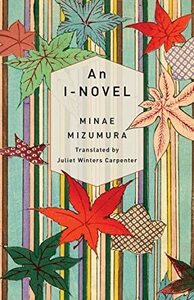Take a photo of a barcode or cover
reflective
slow-paced
This is an interesting book about the author grappling with the duality of growing up in Japan and then moving to the US, but never really fitting there. The book talks a lt about art and language, since the author studied languages at a graduate level. I enjoyed the discussions on Japanese, English, French, the power of writing in certain languages, like your mother tongue, as opposed to the more marketable English. However, when it comes to the autobiographical bits, there is too much detail about things that did not seem that interesting. Personally, I also could not connect to the character since we have very different viewpoints in life. Overall, a good book but probably not for me.
reflective
slow-paced
Written in a mixture of English and Japanese, this book was a sensation when it first came out in Japan. The impact of a novel which uses English within the context of another language to demonstrate the cultural hegemony of English can be translated more easily into any language other than English, but Juliet Winters Carpenter, the translator, has differentiated between passages that were always in English and those that have been translated from Japanese. I don't think I, as someone who only speaks English, can fully appreciate the impact of this book, but nevertheless I found it very compelling. It takes place over one day, the anniversary of Minae, our narrator, and her sister, Nanae's, arrival in the United States twenty years before. Minae and Nanae don't feel that they have ever fully settled down in the US, but they also feel dislocated from their Japanese roots. Minae reads Japanese novels from 80 years ago, and dreams of a Japan of the past, while Nanae jumps from suitor to suitor and can't settle down to anything. During the single day, we witness moments from the past twenty years, which have added together to make the sisters lonely and lost. It's a study of the displacement of life in a city, and the loss of family connections. It's also an exploration of the ways in which English has become ubiquitous and how it feels to move between two languages when one of those languages is so dominant. There are also sections exploring the complexities of racism as experienced by Japanese migrants in the US specifically, and people of colour more generally. It's an expansive novel, seeking to ask many large questions, not just about society, but about writing itself. At times, I found some of the conversations clunky, or the text too meandering, but overall it's an enjoyable, thought-provoking read.
Thanks to Netgalley and the publisher for a review copy!
As a graduate student who is sometimes incapacitated by homesickness and bouts of existential fear, I thought reading Mizumura’s account of a struggling Japanese doctoral student would be extremely relatable. Alas, it wasn’t. Its stream-of-consciousness style was not for me, especially as it was just a rundown of a normal, not particularly eventful life. I guess it was too close to home and the boredom I am experiencing in my own life—reading about it felt like reliving the ennui all over again.
Also, the zigzagging style of the writing was dizzying at times. Its excessive amount of detail was not necessarily alluring, and it kind of dragged on. I struggled to connect with the character, even though it should have been fairly easy for me to do so. Sadly, I also think the translation is a bit clunky. I appreciate it is a big feat to translate a bilingual text, and it seems the translator tried to evoke as similar a feeling as reading the original Japanese text, but it read like a translation, and I feel like a good translation should not show its seams.
Unfortunately, the book failed to stir any emotions in me. It was not for me.
As a graduate student who is sometimes incapacitated by homesickness and bouts of existential fear, I thought reading Mizumura’s account of a struggling Japanese doctoral student would be extremely relatable. Alas, it wasn’t. Its stream-of-consciousness style was not for me, especially as it was just a rundown of a normal, not particularly eventful life. I guess it was too close to home and the boredom I am experiencing in my own life—reading about it felt like reliving the ennui all over again.
Also, the zigzagging style of the writing was dizzying at times. Its excessive amount of detail was not necessarily alluring, and it kind of dragged on. I struggled to connect with the character, even though it should have been fairly easy for me to do so. Sadly, I also think the translation is a bit clunky. I appreciate it is a big feat to translate a bilingual text, and it seems the translator tried to evoke as similar a feeling as reading the original Japanese text, but it read like a translation, and I feel like a good translation should not show its seams.
Unfortunately, the book failed to stir any emotions in me. It was not for me.
At first, it seems as if the book is about nothing in particular.
It's snowing, and Minae looks out the window. There's nobody outside in such weather, not even the prostitutes hanging around the street, nor anyone at the „Afro-American Student Center” across the street, or at the „University Cabaret” next to it.
And as she looks out the window, she ponders on the violent nature of American streets, on what her life in Japan would be like, had she moved back, on whether a prostitute she used to know is alive and well.
Her older sister, Nanae, calls to tell her it's the 2o-year anniversary of their arrival in the US when they were 9 and 11 and their parents moved for job-related reasons.
In stream-of-consciousness style, one thing and then another spark memories, and we come to know about her life in a zigzag fashion going from present to distant past to somewhere in between in no particular order, with no great overarching story arc, but as engrossing and fascinating as a mystery nonetheless - perhaps because the people themselves and their lives were mysteries.
As the book goes on, it felt to me as if it moves away from snapshots of past and present and towards a more emotional and philosophical stance (though this may merely be an impression, and not true).
The story itself is a semi-autobiography based on Minae Mizumura's own life, though I haven't quite managed to figure out what is fiction and what is truth - perhaps that's intentional.
In very simplistic terms, it's the story of an immigrant to America, a girl taken away from her home country when she was old enough to have lived a great part of her childhood in Japan, but nowhere near old enough to make the choice to move for herself. It's a tale of the nostalgia and desire for the home country, of trying to integrate into the new one, never quite belonging. It's a story of being angry with language, and of discovering that those around her don't see her and will never see her as one of their own.
I found the historical details fascinating; the details of what the family brought along from Japan, of what they ate, of what they found in the US, but most of all, their feelings towards it all, and their perceptions. The inability of the mother to quite understand the concept of a blind date, Minae's tendency to sink into an out-of-date, book-inspired Japan that never quite existed, her sister Nanae's surface-deep imitation of American girls, tanning her skin and bleaching her hair.
It's also a story of language. Minae Mizumura scattered her book with English phrases and sentences. When she talks to her sister, when she speaks of things she associates with America, she turns to English. This is so deeply, deeply familiar. While I myself am not a migrant, I pepper my Romanian with English with my friends - I am bilingual, and most of my reading is in English. I've been this way since school, and switching is as natural as breathing.
How odd that a Japanese woman writing in the '90s seems to describe cultural conundrums that I feel deeply as a Romanian woman in 2020, that she speaks of Japanese people of her parents' generation despising their own culture and turning towards the West, while my generation does the same. That she's aware Japanese is an insular and local language and that writing a book in English would gain a worldwide audience (but she decides to write in Japanese), because English is now universal. That there's a constant back and forth: over there or home? Is home even home? To stay or to go? What would be better?
Juliet Winters Carpenter does a brilliant job with the translation (I assume; my Japanese is really nothing to write home about) and has come up with a good way to show that the novel is bilingual, even if the second language is English - words in English in the original have a different typography (my copy shows them as bolded), giving a good sense of when the register is changed. I wonder what it would have been like to read "An I-Novel" in my native Romanian, with the English left as English, but, alas, it hasn't been translated (yet). Would it have felt tacky? Odd? Or even more natural and relatable? I don't know. Maybe one day I'll find out.
Many thanks to NetGalley and Columbia University Press for providing an ARC in exchange for an honest review.
It's snowing, and Minae looks out the window. There's nobody outside in such weather, not even the prostitutes hanging around the street, nor anyone at the „Afro-American Student Center” across the street, or at the „University Cabaret” next to it.
And as she looks out the window, she ponders on the violent nature of American streets, on what her life in Japan would be like, had she moved back, on whether a prostitute she used to know is alive and well.
Her older sister, Nanae, calls to tell her it's the 2o-year anniversary of their arrival in the US when they were 9 and 11 and their parents moved for job-related reasons.
In stream-of-consciousness style, one thing and then another spark memories, and we come to know about her life in a zigzag fashion going from present to distant past to somewhere in between in no particular order, with no great overarching story arc, but as engrossing and fascinating as a mystery nonetheless - perhaps because the people themselves and their lives were mysteries.
As the book goes on, it felt to me as if it moves away from snapshots of past and present and towards a more emotional and philosophical stance (though this may merely be an impression, and not true).
The story itself is a semi-autobiography based on Minae Mizumura's own life, though I haven't quite managed to figure out what is fiction and what is truth - perhaps that's intentional.
In very simplistic terms, it's the story of an immigrant to America, a girl taken away from her home country when she was old enough to have lived a great part of her childhood in Japan, but nowhere near old enough to make the choice to move for herself. It's a tale of the nostalgia and desire for the home country, of trying to integrate into the new one, never quite belonging. It's a story of being angry with language, and of discovering that those around her don't see her and will never see her as one of their own.
I found the historical details fascinating; the details of what the family brought along from Japan, of what they ate, of what they found in the US, but most of all, their feelings towards it all, and their perceptions. The inability of the mother to quite understand the concept of a blind date, Minae's tendency to sink into an out-of-date, book-inspired Japan that never quite existed, her sister Nanae's surface-deep imitation of American girls, tanning her skin and bleaching her hair.
It's also a story of language. Minae Mizumura scattered her book with English phrases and sentences. When she talks to her sister, when she speaks of things she associates with America, she turns to English. This is so deeply, deeply familiar. While I myself am not a migrant, I pepper my Romanian with English with my friends - I am bilingual, and most of my reading is in English. I've been this way since school, and switching is as natural as breathing.
How odd that a Japanese woman writing in the '90s seems to describe cultural conundrums that I feel deeply as a Romanian woman in 2020, that she speaks of Japanese people of her parents' generation despising their own culture and turning towards the West, while my generation does the same. That she's aware Japanese is an insular and local language and that writing a book in English would gain a worldwide audience (but she decides to write in Japanese), because English is now universal. That there's a constant back and forth: over there or home? Is home even home? To stay or to go? What would be better?
Juliet Winters Carpenter does a brilliant job with the translation (I assume; my Japanese is really nothing to write home about) and has come up with a good way to show that the novel is bilingual, even if the second language is English - words in English in the original have a different typography (my copy shows them as bolded), giving a good sense of when the register is changed. I wonder what it would have been like to read "An I-Novel" in my native Romanian, with the English left as English, but, alas, it hasn't been translated (yet). Would it have felt tacky? Odd? Or even more natural and relatable? I don't know. Maybe one day I'll find out.
Many thanks to NetGalley and Columbia University Press for providing an ARC in exchange for an honest review.
After recently devouring (and thoroughly enjoying I might add) Mizumura’s epic saga “A True Novel”, you bet I was desperate to unearth what other literary gems of hers I had yet to discover…
So up next we have an “I Novel” -which is essentially a semi-autobiographical novel, told through a series of flashbacks, memories and conversations, of the authors time spent living and studying as a young Japanese woman in America.
This was definitely a very experimental reading experience. Where language (translation) quite literally played a key part in conveying the authors own personal sense of displacement. Living between -and navigating, languages (English and Japanese), cultures, and countries.
Unfortunately though interesting in premise, the final outcome failed to evoke anything long lasting and impactful. And instead what we we’re left with, is a meandering -somewhat melancholic, trip down Mizumura’s -rather mundane, memory lane.
2.5 stars
So up next we have an “I Novel” -which is essentially a semi-autobiographical novel, told through a series of flashbacks, memories and conversations, of the authors time spent living and studying as a young Japanese woman in America.
This was definitely a very experimental reading experience. Where language (translation) quite literally played a key part in conveying the authors own personal sense of displacement. Living between -and navigating, languages (English and Japanese), cultures, and countries.
Unfortunately though interesting in premise, the final outcome failed to evoke anything long lasting and impactful. And instead what we we’re left with, is a meandering -somewhat melancholic, trip down Mizumura’s -rather mundane, memory lane.
2.5 stars
AN I-NOVEL by Minae Mizumura and translated by Juliet Winters Carpenter is an engaging novel! Translated from the Japanese this is a semi-autobiographical book with Minae being the main character. She reveals her thoughts about growing up in the United States in the 80s as a Japanese woman while talking to her sister. There’s great discussion in this book on being an immigrant, being Japanese-American, Asian vs Japanese, cultural identity and language. There were lots of points I could connect with and Minae is such a relatable character. There were photos included in this book which felt a bit out of place to me. Overall I enjoyed reading this book and it would make a great book club selection as there’s so many interesting topics brought up such as longing for a home country that you haven’t lived in for twenty years, family responsibility, how languages impact your life and how sibling relationships can change over time.
.
Thank you to Columbia University Press via NetGalley for my advance review copy!
.
Thank you to Columbia University Press via NetGalley for my advance review copy!
challenging
emotional
hopeful
reflective
sad
medium-paced
Plot or Character Driven:
Character
Strong character development:
N/A
Loveable characters:
Yes
Diverse cast of characters:
Yes
Flaws of characters a main focus:
Complicated
reflective
slow-paced
This had a lot of interesting things to say about language and race and belonging, but it was incredibly slow moving and I kind of had to drag myself through
“So the gulf was not between me and America. It was something more like a gulf between myself and my American self, or between my Japanese self and my American self--or, to still be more precise, between my Japanese-language self and my English-language self.”
Minae Mizumura took the Japanese genre of the I novel (autobiographical fiction) & upended it. Instead of the confessions of a male Japanese author, we get the inner life, with all its observations, fears & dreams, of young Minae who moved to the U.S. at 12, a huge life shift that left her with a fractured sense of identity. She never feels fully at home in the English language & always feels “other” because she is not white. Leaving Japan during adolescence leaves her longing for it, for the childhood comfort of it, but also feeling increasingly isolated from it the longer she lives in the U.S.
Minae is both the protagonist in the story & the author herself. In interviews (there’s a great one with Benjamin Moser) Mizumura says the events in this book are pretty true to real life, down to some of the dialogue. Of course, she also says I novels allow “fiction ample play” so, as with any work based on life & memory, there is creative embellishment here. The story takes place in one day in Minae’s tiny apartment on the 20th anniversary of her family’s move to the U.S., but not really, because most of the book consists of Minae reflecting on her entire life. Through these reflections we travel between countries, homes & many conversations. Mizumura manages this time-travel so beautifully, so seamlessly, that I felt fully emerged in Minae’s life, in her sense of self.
Despite its POV naturalism & candidness, its surprising humor, there is a particular quality to this book, a feeling of being in multiple places at once, or rather neither firmly here nor there. The harsh realities of life are here, but so is the dreamlike quality of the longing of a displaced consciousness. Minae is physically in one country, but emotionally in another. She exists in a liminal space. Only when she makes a firm decision about where she really wants her life to be, about what she wants to do (or at least attempt to do), does she feel like she can really live her life. This book, my second by Mizumura, was such a pleasure to read.
An important aspect of this book is the different typefaces used. The original published novel changes between English & Japanese, with a bit of French & other languages as well. Translator Juliet Winters Carpenter (who is so brilliant) decided to use different typefaces to indicate a switch between languages. Also, there are black & white photos throughout this book, things like a tree in Long Island & a sidewalk in NYC, which I am assuming was for the benefit of Japanese readers during the initial publication in 1995 (?). Whatever the reason, they add a nice element to the book.






